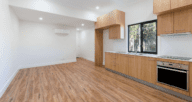What is an Open House? Everything Home Sellers Should Know
- Published on
- 13 min read
-
 Lauren Vella, Contributing AuthorClose
Lauren Vella, Contributing AuthorClose Lauren Vella Contributing Author
Lauren Vella Contributing AuthorLauren is a writer based in Rhode Island. She attended Brown University, where she earned a B.A. in History with a concentration in East Asia. Her work can be found in Southern Rhode Island Newspapers, Brown University's Next Generation, and Awkward & Out.
-
 Taryn Tacher, Senior EditorClose
Taryn Tacher, Senior EditorClose Taryn Tacher Senior Editor
Taryn Tacher Senior EditorTaryn Tacher is the senior editorial operations manager and senior editor for HomeLight's Resource Centers. With eight years of editorial and operations experience, she previously managed editorial operations at Contently and content partnerships at Conde Nast. Taryn holds a bachelor's from the University of Florida College of Journalism, and she's written for GQ, Teen Vogue, Glamour, Allure, and Variety.
Open houses have long stood as a traditional and effective method for showcasing a property to potential buyers. It’s an event where homeowners and real estate agents come together to present a home in its best light.
For buyers, open houses offer a tangible, unfiltered experience of a property — far beyond what photos or virtual tours can provide. Meanwhile, sellers seize this opportunity to highlight their home’s unique features, aiming to create a lasting impression that could expedite their sale.
We’ll discuss the ins and outs of open houses, the pros and cons of having one, and what you can do as the seller to ensure a successful open house.
The history of open houses
Open houses are one of the oldest real estate marketing tricks in the book. The long-standing tradition began in the 1910s as a perk that came with signing an exclusive contract to sell a home.
Prior to the dawn of open houses, anyone could be a real estate agent, so you didn’t need to have a broker’s license to sell a home. As competition among real estate agents became more fierce, exclusive contracts allowed agents to bind themselves contractually to a family and their property to guarantee they would make money off the sale.
With this exclusive representation, agents started to label homes as “open for inspection” and invite the public to tour the home. The first open houses would last days or weeks and were primarily used to sell new homes that would pique the public interest in the developing architectural styles of the time.
What’s the definition of an open house today?
Today, a real estate open house is a marketing event held for a short period of time (usually 2-4 hours on the weekend or in the evening during the week) for the general public to pop by and view a house for sale. Open houses differ from home showings in that they’re not appointment-based and anyone can show up.
An open house is hosted by the listing agent, who represents the seller of the home. It’s the listing agent’s job to show visitors around the house, point out its highlights, and answer potential buyers’ questions about the home’s history, updates, and condition.
The purpose of an open house is to generate buzz and drum up interest in a home to secure a competitive offer, but in some cases, an open house may be more effective in building an agent’s business than actually selling the home.
What happens during an open house?
During an open house, visitors are typically greeted by the listing agent who often provides property brochures or spec sheets detailing the home’s features, square footage, and other important details. Many agents require visitors to sign in, capturing their contact information for follow-up conversations and feedback.
As potential buyers explore the property, they’ll have the freedom to roam from room to room, envisioning themselves in the space. They might test water pressures, open closets to gauge storage, or stand by windows to consider the views.
The agent is available to answer questions, highlight the home’s standout features, and provide insights on the local neighborhood, schools, and amenities. Sometimes, an open house might feature light refreshments, soft background music, or even a professional home stager’s touch to enhance the home’s appeal.
What are the benefits of hosting an open house?
Beyond the obvious goal of showcasing the home, an open house serves multiple purposes. It’s a chance for real estate agents to engage directly with potential buyers, gauge their reactions, and gather real-time feedback for the seller. It’s also an opportunity to cast a wide net, drawing in a diverse group of prospects in a short period of time.
According to Marine Yoo, one of Madison, Wisconsin’s top-selling real estate agents, an open house can be used as a tool to heighten the appeal of your home and motivate buyers to make an offer quickly. If an interested buyer knows that your property is hot and will draw in lots of traffic, they’ll be more inclined to make a competitive offer before the open house even occurs.
“There are two ways that an open house can spur interest in a house and really help a seller,” says Yoo. “One of them is to basically spark a fire under a buyer. So, if a buyer knows that a home is available for sale, and they see an open house is coming up in five days, they know there’s probably decent traffic coming to the open house. So the advice we give all our buyers is, see the property privately right now before all these potential buyers come on Sunday.”
Yoo says that an open house could also be used as the one and only chance for interested buyers to view the property. This way, serious buyers can get a look at the home and the competition when they make their offer to the seller.
“Realtors may opt to decline any showings until the open house, and that strategy drives more traffic,” explains Yoo.
What are the drawbacks of hosting an open house?
An open house is a great way to play up the high demand for your property, but there are some downsides to hosting one.
There’s no guarantee that buyers will show up
Open houses have fallen down the list of effective marketing tactics for home sales. Only 1% of home buyers visited an open house as the first step of their house search in 2023, while just 4% found the home they ended up purchasing from an open house sign. This is largely due to the widespread use of listing services, high-definition photographs, and virtual tours that can be found on the internet.
Open houses can present a security risk to your home
Some sellers have reservations about hosting open houses because they fear that they’re exposing their home to possible damage or theft. If the house doesn’t sell quickly, your real estate agent may end up hosting multiple open houses, exposing your home to a lot of people, in which case, private showings may be a better way to go.
Open houses cost time and money
Open houses can cost sellers time if their home continues to sit on the market. All of that money you’ll spend on premium upkeep, pet and childcare, heating and cooling the home on the day of the open house(s) can start to add up.
When is the best time to host an open house?
The best time to host an open house is on the weekend when potential buyers are available and have time to check out your home after running their morning errands.
In larger metro areas, traffic tends to pick up in the afternoon, so if your property is in the city, you’ll likely want to host your open house anywhere between 11 a.m. and 3 p.m. In the suburbs, traffic is not as much of a concern; host your open house between noon and 4 p.m.
Keep your open house to about two hours. According to Yoo, you want potential buyers to know that there is a limited amount of time for them to see the home. Your home is valuable, and by providing a short window to view it, you’ll be giving buyers what they’ll think is an exclusive look at an in-demand house.
What can a seller do to guarantee a successful open house?
Here are a few things you should do before you let all of those strangers flood into your home.
Deep clean and declutter your home
It should go without saying, but your home should be spotless before potential buyers arrive. Deep cleaning and decluttering will improve first impressions and can even add $8,000 of resale value on average, according to HomeLight’s Summer 2023 Top Agent Insights Report. If you need to, hire a professional cleaning service for $30 to $50 per hour to get the job done.
Invest in home staging
When potential buyers enter your home, you want them to be able to picture what their life would be like if they lived there. Hire a staging company to change out and rearrange your furniture, paint your walls — we recommend a nice neutral beige tone — and let in natural light. Agents estimate that staging your home increases its value by 18%.
Advertise your open house on the internet
96% of home buyers use the web in their search for a new home. Your agent will advertise your open house on the internet — on the multiple listing service (MLS) and the top real estate listing websites that share open house event details, such as Trulia, Zillow, and Redfin. You can also post your open house on places like Nextdoor, Craigslist, and Facebook Marketplace.
Promote the event with physical signs
Even though the internet is a reliable, efficient information resource for open houses, lawn signs on the day of your event are a must. Be sure to set up ample signage guiding buyers to your open house, so they have no trouble finding the home.
Keep your messaging simple. For example, your sign might say “Open House Next Left.” Signs should also be in bright colors, so they stand out.
What’s an agent’s job during the open house?
An agent’s job during an open house is to be the steward of your home. That means that he or she will welcome guests into the house, answer questions about the home, and keep track of guests that enter and exit the property in order to follow up with potential buyers who seem interested.
“Visitors have to sign in no matter what, or else they’re not getting to tour the house,” says Yoo. “Any good Realtor worth their salt will hunt that buyer down — and I use that obviously as a joking manner — to the ends of the earth to see if they have any further interest.”
In fact, it’s a good idea to leave the actual open house to your agent. When the owner of a home is present during an open house, potential buyers can find it difficult to be fully honest with the real estate agent about what they find displeasing.
“People just do not feel comfortable talking about a property and being critical about a property — even if it’s just being constructive — if the homeowner is there,” Yoo says.
Broker’s opens: An alternative to the traditional open house
Unlike traditional open houses, which invite the general public, a broker’s open caters specifically to real estate agents and professionals. Held during a weekday, this event provides an opportunity for agents to preview the property on behalf of their potential buyers. Given the professional nature of attendees, these events can be more focused, allowing the listing agent to gather valuable feedback on pricing, staging, and any possible issues that might deter potential buyers.
The advantage of a broker’s open is twofold. For sellers, it can lead to quicker offers since agents who see the property might believe it’s a perfect fit for one of their clients. For agents, it offers an exclusive look at a listing, allowing them to be more efficient in their property selections for buyers. By utilizing broker’s opens, many properties get significant initial exposure to the real estate community, potentially streamlining the selling process.
An experienced real estate agent will know whether an open house or broker’s open is the right choice for your home. HomeLight can connect you with a top agent in your market who will help you prep your house for sale, market it effectively to get interested buyers in the door, and be present at the open house or broker’s open to showcase all your home has to offer.
Header Image Source: (Markus Spiske / Unsplash)
Open house FAQ
While open houses can increase exposure for a property, they aren’t mandatory. Some sellers find success without them, relying on online listings and private showings. The effectiveness of an open house can vary based on the local market, property type, and price range.
Preparation includes decluttering, deep cleaning, and staging the home to make it appealing to potential buyers. Personal belongings should be minimized to allow visitors to envision themselves in the space. Some sellers also invest in professional staging or make minor repairs based on agent recommendations.
It’s a good practice to remove or securely store valuable items like jewelry, electronics, and personal documents. Some sellers choose to install temporary security cameras for added peace of mind. Your real estate agent will generally be present to monitor visitors, but it’s a good idea to take extra precautions.
Typically, the listing agent or a member of their team will host the open house. They will guide potential buyers, answer questions, and gather feedback. It’s also a chance for the agent to meet potential clients.
Feedback can be immediate, with some agents and potential buyers providing insights during or right after the event. However, offers might take a bit longer, ranging from a few hours after the open house to several days, depending on the buyer’s interest level and market dynamics.




